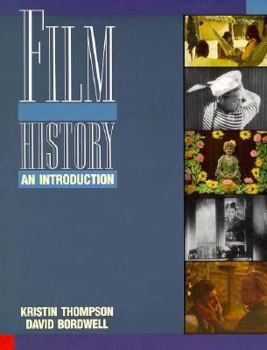Film History: An Introduction (Softcover)
Select Format
Select Condition 
Book Overview
Written by two of the leading scholars in film studies, Film History: An Introduction is a comprehensive, global survey of the medium that covers the development of every genre in film, from drama and... This description may be from another edition of this product.
Format:Paperback
Language:English
ISBN:0070064458
ISBN13:9780070064454
Release Date:February 1994
Publisher:McGraw-Hill Humanities/Social Sciences/Langua
Length:857 Pages
Weight:3.65 lbs.
Dimensions:1.2" x 7.9" x 9.9"
Customer Reviews
6 ratings
Received the wrong edition
Published by Thriftbooks.com User , 5 years ago
I thought I was getting the 3rd edition but I got the second... what's up with that?
A treat for film buffs
Published by Thriftbooks.com User , 16 years ago
Excellent film studies text--informative. Delineates the different epochs of film not only in the U.S. It includes international film and the work of Eisenstein, Renoir, Kurosawa, and others. Concise language and beautiful black-and-white and color reproductions.
Great Read
Published by Thriftbooks.com User , 16 years ago
I had this book for a Film History class, and it was great. I've used it every semester since and plan to keep it forever and sleep with it under my pillow. Even though it isn't aimed at teaching film theory or basics, it's better at explaining the basics than Film Art by miles. It also makes theory more interesting and topical to learn since it goes chronologically and highlights films that were actually influential, instead of the ones that Film Art just happened to get the rights to print pictures of. Highly recommend.
The best single-volume book on film history
Published by Thriftbooks.com User , 18 years ago
If you are interested in film history on the whole, please, give yourself a treat by purchasing this book. It is not cheap but it is worth every penny. I had it after a course in film history and despite being someone who usually sell or dump away my texts after graduation, I find it very hard to give this one away. Boy, am I glad I did not. As one's scope and experience in world cinema grows, so too does one's interest in this book. Bordwell and Thomas's style is academic but always enthusiastic, and theirs is the most comprehensive account of world cinema in English (pre-war Japanese cinema, anyone?). I have not found another general film book on world cinema history to match, and I will certainly be purchasing its third edition (what I have is the first) if that ever comes by.
comparison
Published by Thriftbooks.com User , 18 years ago
here's a short comparison I made between the following 3 film history books: A History of the Cinema from Its Origins to 1970 (Eric Rhode) A Short History of the Movies (Gerald Mast) Film History: An Introduction, (Thompson-Bordwell) I was looking for a technical/historical overview of the development of cinema, without idiosyncratic criticism and with emphasis on the origins of film techniques, genealogy of influences of filmmakers, relevant references to history, literature and other arts, and impartial accounts of filmmakers' careers. Instead of a verdict, I will simply quote passages about two greats: Rhode: [about Fellini] "Fellini's greatest works are inevitably works of laughter and tears. [...] Fellini gets into trouble when he deserts feeling for thought. La Dolce vita (1959) is a sterile thematic exercise [...] In the film's first sequence, a helicopter [...] The film, intellectualy, is over. Christ has been petrified into wood; he is the tool of modern machinery [...] Although the film has nothing more to say, Fellini continues for two hours, contrasting sensual things [...] Juliet of the Spirits [...] suffers from a similar over-schematization." Mast: [about Antonioni] "Antonioni sometimes has trouble in allowing his images to accrete meaning [...] His failure to generalize experience was to be total in La notte (1960). Lacking any understanding of how writers think and feel, his portrait of the author, [...] is so unconvincing that the spectator may be tempted to think that Giovanni's crisis of conscience is no more than a rationalization of his inability to escape from his wife's purse-strings." Thompson-Bordwell: [about Antonioni] "From the start of his career Antonioni demonstrated a mastery of deep focus (Fig. 19.30) and the long take with camera movement (pp. 427-429). The early works also pioneered [...] Antonioni's muted dramatization of shallow or paralyzed characters found a sympathetic response in an era that also welcomed Existentialism. [...] Juan Bardem, Miklos Jansco, and Theo Angelopoulos learned from his distinctive style. Francis Ford Coppola's The Conversation (1974) and Brian De Palma's Blow-Out (1981) derive directly from Blow-Up." nuff said...
Comprehensive, nicely packaged
Published by Thriftbooks.com User , 22 years ago
I used this book in a film studies class about four years ago and I kept it because of the wealth of information. For the first time I understood the different epochs of film not only in the U.S. but also around the world. I was introduced to a wider variety of international film and the work of Eisenstein, Renoir, Kurosawa, and others. I highly recommend this book for the concise language, easy explanations, and beautiful black and white and color reproductions from many films. This book is a page turner.






